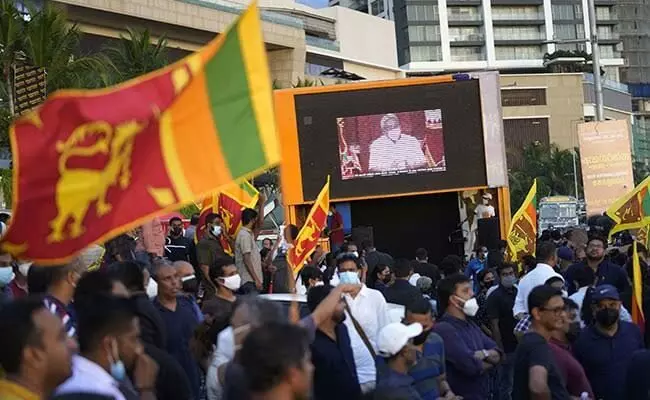
Sri Lanka president declares state of emergency amid crippling strikes
text_fieldsColombo: Crisis-hit Sri Lanka on Friday declared a state of emergency giving security forces sweeping powers for the second time in five weeks to deal with escalating anti-government protests.
The emergency was declared by Sri Lanka President Gotabaya Rajapaksa citing "public security and the protection of public order and for the maintenance of supplies and services essential to the life of the community".
It was announced that it would come into effect on May 6 at midnight.
This comes after trade unions staged a nationwide strike Friday demanding the President's resignation over a worsening economic crisis.
Earlier today, the police again fired tear gas and water cannon at students trying to storm Sri Lanka's parliament as the country was brought to a halt by a trade union strike demanding the government step down.
Months of blackouts and acute shortages of food, fuel, and pharmaceuticals have caused widespread suffering across the island nation of 22 million people.
Public anger has sparked sustained protests demanding the government's resignation over its mismanagement of the crisis, Sri Lanka's worst since independence in 1948.
Thousands of student protesters had been camped on the road leading to the legislature, which is on a man-made island on a lake in the capital Colombo, since Thursday.
Officers fired a barrage of tear gas followed by water cannon from two trucks, but the crowd quickly reassembled behind police barricades set up to block access to the parliament.
It was the second time police tried to disperse the crowd with tear gas, after an earlier unsuccessful attempt on Thursday afternoon.
Millions of workers stayed off the job today in a strike organized by the country's trade union movement, with all but one scheduled train service canceled. Privately owned buses were off the roads while industrial workers demonstrated outside their factories and black flags were hung across the country in an expression of anger against the government.
"We can pinpoint the policy blunders of the President that led to this very sorry state of our economy," said trade union leader Ravi Kumudesh. "He must go."
Private buses, which account for two-thirds of the country's fleet, were also off the road, Private Bus Operators Association chairman Gemunu Wijeratne said.
Mr. Rajapaksa has insisted he will not step down despite escalating demonstrations across the island, including a protest that has been camped outside his seafront office for nearly a month.
Sri Lanka's economic crisis took hold after the coronavirus pandemic hammered income from tourism and remittances.























